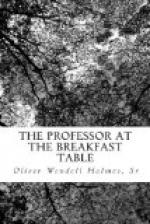—The arguments which the greatest of our schoolmen could not refute were two: the blood in men’s veins, and the milk in women’s breasts.
—Humility is the first of the virtues—for other people.
—Faith always implies the disbelief of a lesser fact in favor of a greater. A little mind often sees the unbelief, without seeing the belief of a large one.
The Poor Relation had been fidgeting about and working her mouth while all this was going on. She broke out in speech at this point.
I hate to hear folks talk so. I don’t see that you are any better than a heathen.
I wish I were half as good as many heathens have been,—I said.—Dying for a principle seems to me a higher degree of virtue than scolding for it; and the history of heathen races is full of instances where men have laid down their lives for the love of their kind, of their country, of truth, nay, even for simple manhood’s sake, or to show their obedience or fidelity. What would not such beings have done for the souls of men, for the Christian commonwealth, for the King of Kings, if they had lived in days of larger light? Which seems to you nearest heaven, Socrates drinking his hemlock, Regulus going back to the enemy’s camp, or that old New England divine sitting comfortably in his study and chuckling over his conceit of certain poor women, who had been burned to death in his own town, going “roaring out of one fire into another”?
I don’t believe he said any such thing,—replied the Poor Relation.
It is hard to believe,—said I,—but it is true for all that. In another hundred years it will be as incredible that men talked as we sometimes hear them now.
Pectus est quod facit theologum. The heart makes the theologian. Every race, every civilization, either has a new revelation of its own or a new interpretation of an old one. Democratic America, has a different humanity from feudal Europe, and so must have a new divinity. See, for one moment, how intelligence reacts on our faiths. The Bible was a divining-book to our ancestors, and is so still in the hands of some of the vulgar. The Puritans went to the Old Testament for their laws; the Mormons go to it for their patriarchal institution. Every generation dissolves something new and precipitates something once held in solution from that great storehouse of temporary and permanent truths.
You may observe this: that the conversation of intelligent men of the stricter sects is strangely in advance of the formula that belong to their organizations. So true is this, that I have doubts whether a large proportion of them would not have been rather pleased than offended, if they could have overheard our, talk. For, look you, I think there is hardly a professional teacher who will not in private conversation allow a large part of what we have said, though it may frighten him in print; and I know well what an under-current of secret sympathy gives vitality to those poor words of mine which sometimes get a hearing.




